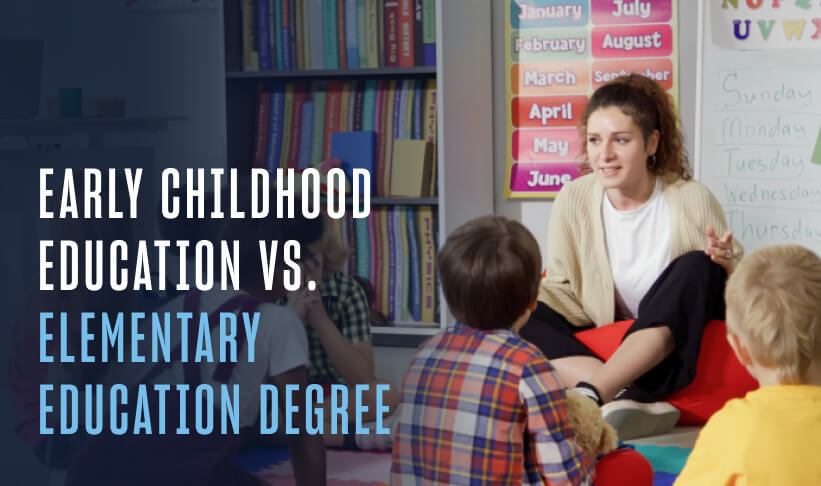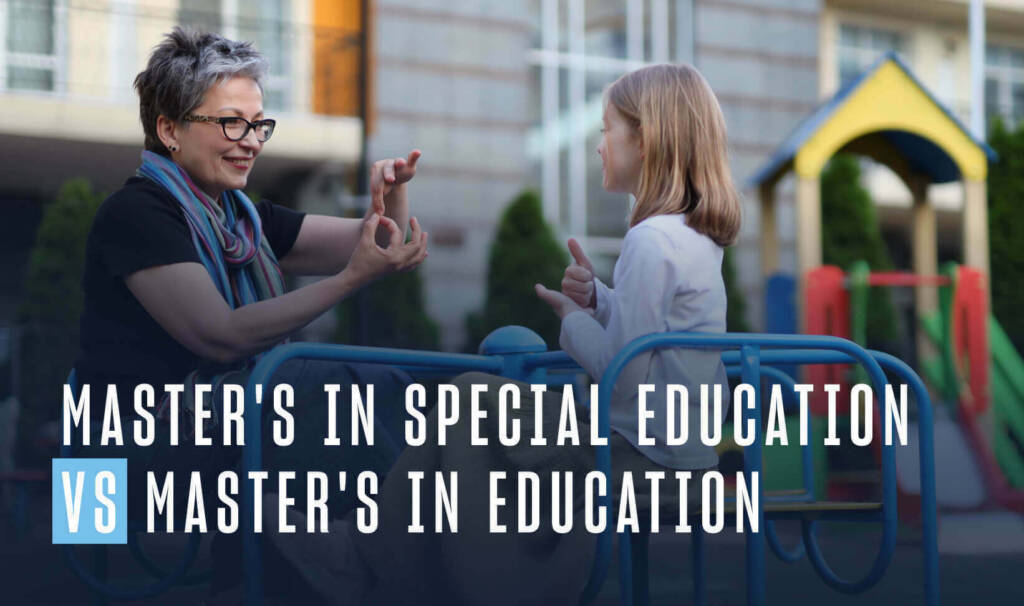Choosing between a Master of Early Childhood Education and a Master of Elementary Education requires careful consideration of individual preferences, career goals and educational requirements.
Do you prefer to work with toddlers and preschoolers, or are you more inclined to teach older children? Are you more interested in child psychology and cognitive development, or do you have a passion for teaching science to third graders? While a general Master of Education program may cover all of the fundamentals of teaching students K–12, some teachers choose to pursue even more specialized degrees focused on specific age groups.
Read on to learn more about the differences between a Master of Early Childhood Education and a Master of Elementary Education, and find out which one may be the better fit for your goals.
Want the Brochure for USD’s Online Master of Education Degree?
Earn your M.Ed. in just 20 months with a program designed for working professionals.
What Is Early Childhood Education?
Early childhood education focuses on fostering the development of children from birth to approximately eight years old, emphasizing the cultivation of language, literacy and social skills crucial for their future success. Teachers take play-based approaches to instruction and learn to encourage children to take the lead in their learning journey. More than simply imparting academic concepts, early childhood educators are preparing young learners for both academic and social environments inside and outside the classroom.
Early childhood education — usually considered to span daycare or preschool through second grade — focuses heavily on the following components:
- Play-based learning: Guided play with a variety of toys, engaging activities and imaginative or role-playing games.
- Self-directed learning: The practice of encouraging children to choose their activities, with teachers providing support by prompting them to explain the direction of their activities.
- Social and emotional development: Helping young children understand and express their feelings using words, thereby developing healthy relationships with peers and adults.
The first eight years of a child’s life are critically important for healthy cognitive development. Early childhood educators play a vital role in providing a safe and stimulating environment conducive to learning and growth during this time. Toddlers, in particular, are highly receptive to learning new concepts, making it imperative for educators to ensure they are exposed to enriching experiences that promote healthy habits and social skills.
Early childhood education can take place in elementary schools, learning centers or in any number of non-school-affiliated organizations specifically dedicated to developing young learners.
What Is a Master’s in Early Childhood Education?
A Master’s in Early Childhood Education (ECE) is an advanced degree program designed to equip educators with the necessary tools and knowledge to effectively nurture young children’s cognitive and social development. Like most master’s degrees, a Master of ECE takes two years to complete on a full-time class schedule.
A Master of ECE curriculum covers a wide range of topics, including:
- Foundational principles of education
- Fundamentals of early childhood development
- Child psychology
- Curriculum design for young learners
- Current issues in early childhood education
Some programs may also require the completion of a capstone project, such as creating lesson plans or conducting research, as a culmination of the degree.
Educational Requirements for Early Childhood Education
Educational requirements for working in early childhood education vary depending on the specific role and the standards of the employing institution.
- Associate’s degree: Many positions in early childhood education require at least an associate’s degree in ECE or a related discipline. This is the most common educational requirement in the field.
- Bachelor’s degree: Some roles, particularly in public preschools or more advanced positions, may require a bachelor’s degree in early childhood education or a related field.
- Certificate: An early childhood education certificate may be necessary to work in a childcare center or as an assistant teacher. This certificate typically provides specialized training in early childhood education principles and practices.
- Child Development Associate (CDA) credential: This nationally transferable certification demonstrates that an individual has passed an exam based on core principles of early childhood education and has undergone verification visits by supervisors, including observation of their interactions with young children.
- State licensure: Early childhood educators typically need to be licensed in the state where they plan to work. Licensure requirements vary by state, but often include completing specific educational coursework, passing exams and meeting other criteria.
- Background check: All individuals working in early childhood education must pass a background check to ensure the safety and well-being of children in their care.
- Internship or practicum: Completion of a supervised internship or practicum is often a requirement for early childhood education programs. This hands-on experience allows individuals to apply theoretical knowledge in real-world settings under the guidance of experienced educators.
While many teaching positions in early childhood education require at least a bachelor’s degree, obtaining a master’s degree can open up more job options or opportunities to pursue advanced roles beyond the classroom. Graduates with a Master’s in Early Childhood Education may qualify for administrative and executive positions such as childcare center director or school psychologist, thereby expanding their career options and potential for higher earnings.
Are You An Educator Considering the M.Ed Path?
Read the top 11 reasons to earn your master of education degree.
What Is Elementary Education?
Elementary education refers to the phase of formal education that follows preschool and precedes middle school. It generally encompasses the education of students from kindergarten through fifth or sixth grade; while it has some overlap with early childhood education, elementary education usually refers to an established classroom environment (i.e. in a school or formal learning institution). Also called primary education, this stage focuses on building upon the social, language and literacy skills acquired in earlier years, while introducing children to a more structured curriculum across core academic subjects.
Teachers play a leading role in elementary education, guiding students through lessons designed to foster curiosity and enhance information retention. Key components of elementary education include:
- Reading comprehension: Helps children absorb information and gain a deeper understanding of various subjects and the world around them.
- Writing: Provides children with a means to express themselves effectively, articulate ideas on different subjects and explore their creativity.
- Foundational math: Focuses on helping children understand quantities and calculations and develop a sense of logic.
- Foundational science: Builds upon the logical thinking fostered in math and reading comprehension while encouraging exploration and understanding of the natural world.
- Social studies: Exposes students to different cultures and human relationships to foster empathy and global awareness.
- The arts: Helps children develop an appreciation for music, fine art, visual art and storytelling, encouraging creativity and self-expression.
- Development of critical thinking and problem-solving skills: Leads students in learning to think critically, analyze information and solve problems independently, laying a foundation for academic success and lifelong learning.
What Is a Master’s in Elementary Education?
A Master’s in Elementary Education is an advanced degree that provides educators with specialized skills and knowledge necessary to teach and lead in elementary school settings. This degree typically offers an in-depth exploration of pedagogy, curriculum development, child development and educational leadership tailored specifically for an elementary-aged population.
The curriculum of a Master’s in Elementary Education typically covers a wide range of topics such as:
- Pedagogical approaches for elementary education
- Curriculum design and development
- Assessment and evaluation techniques
- Child development and psychology
- Special education strategies for diverse learners
- Literacy instruction and language development
- Mathematics and science education
- Social studies and multicultural education
- Classroom management and behavior intervention strategies
- Educational technology integration
These courses help degree candidates develop a diverse set of skills, including:
- Leveraging effective instructional strategies for diverse learners
- Curriculum planning and implementation aligned with educational standards
- Assessment and data-driven decision-making to monitor student progress
- Classroom management techniques to create a positive learning environment
- Collaboration and communication skills for working with colleagues, students and families
- Leadership and advocacy for promoting educational equity and student success across diverse populations
Completing a Master’s in Elementary Education usually takes around two years of full-time study. However, part-time options may also be available, which could extend the duration of the program.
Graduates with a Master’s in Elementary Education have a variety of career opportunities available to them, including classroom teacher, curriculum specialist, instructional coach, school administrator, education consultant or special education teacher (with the appropriate specialized training).
Admission requirements for a Master’s in Elementary Education program typically include a bachelor’s degree from an accredited institution, often in education or a related field. Some programs may also require a minimum GPA, letters of recommendation, a personal statement and/or relevant classroom teaching experience. Degree candidates may be required to complete an additional practicum or student teaching experience for licensure or certification in some states or countries.
Educational Requirements for Elementary Education
Educational requirements to work in elementary education vary, depending on whether it’s in a public or private school setting.
- Bachelor’s degree in education: Public schools typically require elementary teachers to have a bachelor’s degree in education. Private schools may require a bachelor’s degree for elementary teachers, but it doesn’t necessarily need to be in education. Degrees in other fields may be acceptable, especially if the candidate has relevant experience or expertise in the subject area they’ll be teaching. Some private schools may require elementary teachers to pass an alternative teacher certification exam if they don’t have a traditional education degree.
- Master’s degree: While not always mandatory, it is becoming increasingly preferred for elementary teachers to have a master’s degree. A Master of Education (M.Ed.) or Master of Arts in Teaching (MAT) can provide advanced training and specialization in areas such as curriculum design, educational leadership or specialized content areas.
- Student teaching program: Prospective elementary teachers must complete a student teaching program under the guidance of a licensed teacher. This hands-on experience helps them practice applying educational theory in real-world teaching situations.
- Approved teacher education program: Prospective elementary teachers must complete an approved teacher education program recognized by the state’s department of education. These programs typically include coursework in education theory, teaching methods and supervised teaching experiences.
- State licensure: Upon completing their education and meeting all requirements, public elementary teachers must obtain state licensure. Private schools often have their own hiring criteria and may not require state licensure.
- Professional or academic references: Private schools especially may request professional or academic references to assess a candidate’s qualifications and suitability for a teaching position.
Important Skills for Teaching Early Childhood Education
Teaching, as a whole, requires a diverse set of both hard and soft skills, and early childhood education is no different. The following skills and traits are essential for effectively leading lessons and facilitating cognitive and social development for young learners.
Hard or technical skills:
- Pedagogical knowledge
- Curriculum development
- Assessment and evaluation
- Classroom management
- Early literacy and numeracy instruction
- Special education strategies
- Educational technology integration
- Parent and community collaboration
Soft skills or personal traits:
- Patience
- Flexibility
- Empathy and compassion
- Creativity
- Communication skills
- Observational skills
- Teamwork
- Resilience
Candidates for a Master of Early Childhood Education work to build and strengthen these skills through classwork and practical application.
Important Skills for Teaching Elementary Education
Many of the skills needed to lead elementary school classrooms are the same as those preferred in early childhood educators, with a few more advanced capabilities to instruct older students.
Hard or technical skills:
- Pedagogical knowledge
- Curriculum development and implementation
- Assessment and data analysis
- Differentiated instruction
- Classroom management
- Content area expertise
- Technology integration
- Collaboration and professional development
Soft skills or personal traits:
- Patience
- Adaptability
- Empathy and compassion
- Creativity
- Communication skills
- Leadership
- Resilience
- Self-reflection
Want the Brochure for USD’s Online Master of Education Degree?
Earn your M.Ed. in just 20 months with a program designed for working professionals.
Master’s in ECE vs. Elementary Education Job Outlook
Both the early childhood education and elementary education fields offer significant opportunities for educators with the appropriate qualifications and credentials. Employment variables largely depend upon geographic location and specific educational requirements within different school districts.
According to the U.S. Bureau of Labor Statistics (BLS), employment of preschool teachers is projected to grow by 3 percent from 2022 to 2032 — an average rate compared to all occupations — which translates to approximately 56,300 job openings every year over the next decade. Opportunities may be affected by varying standards and regulations across different school districts, as there is no national standardization in preschool education.
By contrast, the overall employment of kindergarten and elementary school teachers (comprising a larger population pool) is expected to show little to no change during the same period. Despite this, about 109,000 jobs for kindergarten and elementary school teachers are projected to open each year through 2032, many of which will result from teachers retiring or moving to different professions.
Elementary educators may find more opportunities in urban and rural districts compared to suburban areas. There may also be more demand for elementary teachers with advanced degrees and certifications, which could lead to increased job prospects for those who pursue continuing education.
Employment opportunities could increase even further for elementary school teachers who pursue advanced degrees to diversify their skill sets; for example, specializing in certain content areas can lead to roles such as instructional coordinator, curriculum developer, special education teacher or educational specialist.
Likewise, those with a Master’s in Early Childhood Education could pursue alternative teaching roles such as childcare worker, childcare center director and special education teacher for younger children.
M.Ed. in Early Childhood Education vs. M.Ed. in Elementary Education
| M.Ed. Early Childhood Education | M.Ed. Elementary Education | |
| Common Courses | – Foundations of Early – Childhood Education – Child Development and Psychology – Curriculum and Instruction in ECE – Assessment and Evaluation in ECE – Language and Literacy – Development Mathematics and Science – Education for Young Children – Social and Emotional Development – Inclusion excellence in ECE – Family and Community Partnerships – Educational Leadership and Advocacy in ECE | – Foundations of Elementary Education – Curriculum Development and Instructional Design – Assessment and Evaluation in Elementary Education – Literacy Instruction and Development – Mathematics Education for Elementary Teachers – Science Education for Elementary Teachers – Social Studies Education for Elementary Teachers – Differentiated Instruction and Classroom Management – Special Education Strategies for Inclusive Classrooms – Technology Integration in Elementary Education |
| Skills Developed | – Curriculum development – Child development knowledge – Assessment and evaluation techniques – Differentiated instruction – Classroom management – Language and literacy instruction – Mathematics education Science education – Social and emotional development support – Family and community collaboration | – Curriculum development – Classroom management – Differentiated instruction – Assessment and evaluation techniques – Literacy instruction – Mathematics instruction – Science instruction – Social studies instruction – Technology integration – Collaboration and teamwork |
| Age Focus | Birth–8 years old | 5–11 years old |
| Potential Careers | – Preschool Director – Childcare Center Director – Early Childhood Education Consultant – Special Education Teacher (Early Childhood) – Early Childhood – Education Program Coordinator | – Elementary School Teacher – Curriculum Specialist – Instructional Coach – Educational Administrator (Elementary School) – Education Policy Analyst |
| Salary Expectations (Role-dependent) | $40,000–$65,000 | $60,000–$100,000 |
M.Ed. Early Childhood Education vs. M.Ed. Elementary Education: How to Choose
If you have a strong passion for working with infants and toddlers, a Master of ECE may be the right choice. This type of program focuses on early childhood development and prepares candidates for careers in preschools, childcare centers and early intervention programs. Compared to elementary education, the requirements for entering the field of early childhood education are typically less stringent. While a bachelor’s degree may be preferred, ECE teachers can often start their careers with an associate’s degree and pursue additional certifications such as the CDA credential.
It’s important to consider that early childhood educators generally earn lower salaries compared to those in elementary education. Anyone pursuing a Master of ECE should be prepared for a lower earning potential compared to their counterparts in elementary education.
A Master of Elementary Education offers significantly more opportunities beyond traditional classroom teaching. Graduates may explore roles such as curriculum specialist, instructional coordinator or educational administrator, through which they can make a broader impact on education by shaping district-wide curriculum or educational policies.
Ultimately, the decision between a Master of Early Childhood Education and a Master of Elementary Education depends on your individual interests, career aspirations and preferred student age group. As you thoroughly research each program, consider your long-term career goals and weigh the potential benefits and challenges of each option before making a decision.
If a flexible learning format is a priority for you, consider the 100%-online Master of Education program from the University of San Diego. With specializations in Curriculum & Instruction, Technology & Innovation, STEAM Education, Inclusive Learning and School Leadership, this innovative graduate program is designed to accommodate a busy schedule, so you can continue to work in the classroom while learning skills you can apply right away.
Explore the M.Ed. curriculum and start planning your degree today.




